* You are viewing Posts Tagged ‘Europe’
Philip Beeley
May 31, 2012
Events, Lectures, Project Updates
Tags: Astronomy, Editions, Europe, History of Science, Johannes Hevelius, Networks, Seventeenth Century, Theft
On 26 September 1679, while the astronomer Johannes Hevelius and his wife Elizabetha were spending a relaxing evening in gardens outside the gates of their home city of Danzig (Gdańsk), fire consumed their house in the old town. A large part of their possessions, books, personal manuscripts, and instruments, was destroyed; by the following morning the observatory which Hevelius had carefully erected on the roof of the house lay in ruins.
Much was irretrievably lost, but remarkably the letters he had exchanged with the learned men and women of Europe, including Kepler, Boulliau, Gassendi, Christiaan Huygens, Oldenburg, Wallis, and Kircher, together with his treasured collection of Kepler manuscripts, survived. At that time comprising thirteen volumes, the correspondence of Hevelius constitutes one of the great resources for the study and appreciation of early modern scientific networks.
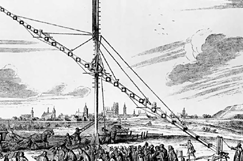
Hevelius’s 45m focal-length telescope.
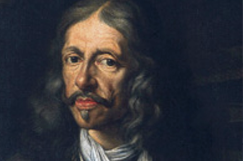
Johannes Hevelius.
Making this extraordinarily rich corpus available to the wider scholarly community is the task of a major collaborative editorial project currently underway in France, Germany, and Poland, of which I am pleased to be serving on the advisory committee. With most of the over 2,700 surviving letters now housed in collections at the BNF and the Bibliothèque de l’Observatoire in Paris, it was particularly fitting that the director of the French team Professor Chantal Grell (University of Versailles) – accompanied by Professor Robert Halleux (University of Liège) – should inform our third seminar series of the background and methodologies of this ambitious enterprise on Thursday 10 May. In a talk entitled ‘Editing the Correspondence of Johannes Hevelius: Networks, Themes, and Methodological Challenges’, Chantal first provided an overview of Hevelius’s life and letters, before giving a lively account of the complex archival afterlives of the astronomer’s epistolary collection following his death in 1687, including details of the letters famously purloined by Guillaume Libri in the mid-nineteenth century. Following a conspectus of Hevelius’s many correspondents, Chantal concluded with an analysis of the exemplary seventeenth-century scientific exchange between Hevelius and Pierre de Noyers, the secretary to the Queen of Poland. Following an interesting question and answer session – which included, inter alia, discussion of the benefits and challenges of balancing hard copy and digital outputs within large-scale correspondence projects – the evening came to fitting conclusion with a visit to the opening of the Renaissance in Astronomy exhibition at the Museum of the History of Science.
Seminars take place in the Faculty of History on George Street on Thursdays at 3pm. For future talks in the series, please see the seminar webpage. All are welcome!
James Brown
March 27, 2012
Front Page, Project Updates, Publications, Videos
Tags: Editions, Europe, History of Science, John Wallis, Mathematics, Networks, Seventeenth Century
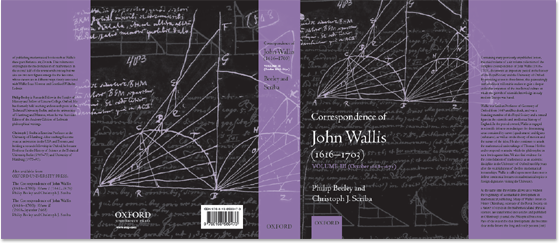
We are pleased to report that Volume III of The Correspondence of John Wallis (1616-1703) – one of a number of epistolary editions the Project is supporting, and the latest installment of the prestigious multi-volume edition of the mathematician’s letters – is now available for pre-order from Oxford University Press, pending publication in May. Painstakingly crafted by our Research Fellow Philip Beeley in conjunction with Christoph J. Scriba, work on the third volume began in the context of the AHRC-funded Wallis Project, and has been completed under the auspices of Cultures of Knowledge.
Consisting of 254 letters in total, the volume covers the exciting period 1668 to 1671, during which England was at peace with itself and its neighbours, publication techniques were becoming ever-more sophisticated (especially with the emergence of academic journals), and scientific activity thrived across the continent. It finds Wallis embroiled in fascinating debates on techniques for determining areas contained by curves (quadratures) and figures (cubatures), as well as on theories of motion and the nature of tides. Other volume highlights include Wallis’s celebrated disputes with Thomas Hobbes and French mathematician François Dulaurens, and ceremonial visits to Oxford by the Crown Prince of Tuscany and William of Orange, during which – in telling evidence of rapid disciplinary consolidation – Wallis presented the visiting dignitaries with examples of state-of-the-art geometrical thinking. Below, Philip discusses the latest installment and looks ahead to Volume IV, which will be delivered in the summer.
For further publication details and to pre-order your copy, please visit the OUP website. For background information about Wallis and other outputs emerging from this sub-project (including podcasts, video, and a complete catalogue of Wallis’s extensive correspondence within Early Modern Letters Online), head along to the Wallis webpage.
In exciting news for scholars of the Moravian educator and CofK stalwart Jan Amos Comenius, two Comenius-related publications prepared by colleagues and partners at the Czech Academy of Sciences have recently been released:
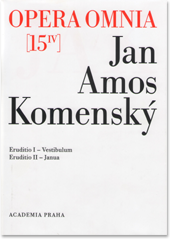 The new volume of J. A. Comenii Opera Omnia, 15/IV, appeared with Academia (Prague) in November 2011. Prepared by Martin Steiner, Markéta Klosová, and others, the volume builds on three installments already published under 15 and continues the ongoing work of the Opera Didactia Omnia corpus. The edition encompasses a significant part of Comenius’s activities in Hungary, including complete versions of textbooks prepared for the first two classes of his Latin school, and includes a full editorial apparatus as well as notes, comments, and summaries of information on edited works already available in English. For further information and to order a copy, please visit the publisher’s website.
The new volume of J. A. Comenii Opera Omnia, 15/IV, appeared with Academia (Prague) in November 2011. Prepared by Martin Steiner, Markéta Klosová, and others, the volume builds on three installments already published under 15 and continues the ongoing work of the Opera Didactia Omnia corpus. The edition encompasses a significant part of Comenius’s activities in Hungary, including complete versions of textbooks prepared for the first two classes of his Latin school, and includes a full editorial apparatus as well as notes, comments, and summaries of information on edited works already available in English. For further information and to order a copy, please visit the publisher’s website.
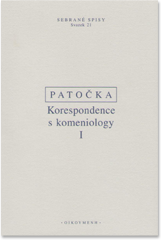 The letters of Jan Patočka, prepared by Věra Schifferová, have also been released in two volumes (1931-77) by Oikoymenh. A leading Czech philosopher of the twentieth century, Patočka was an eminent interpreter of Comenius’s life and work who corresponded extensively with other students of the pedagogue worldwide such as Milada Blekastad, Stanislav Sousedík, Julie Nováková, Jiřina Popelová, Josef Brambora, Antonín Škarka, Dmytro Čyževskyj, Klaus Schaller, Marcelle Denis, Franz Hofmann, and George Henry Turnbull. The letters, published in Czech, shed important light on Comenius as well as on the evolution of scholarly attitudes towards him. For further information and to order a copy, please visit the publisher’s website.
The letters of Jan Patočka, prepared by Věra Schifferová, have also been released in two volumes (1931-77) by Oikoymenh. A leading Czech philosopher of the twentieth century, Patočka was an eminent interpreter of Comenius’s life and work who corresponded extensively with other students of the pedagogue worldwide such as Milada Blekastad, Stanislav Sousedík, Julie Nováková, Jiřina Popelová, Josef Brambora, Antonín Škarka, Dmytro Čyževskyj, Klaus Schaller, Marcelle Denis, Franz Hofmann, and George Henry Turnbull. The letters, published in Czech, shed important light on Comenius as well as on the evolution of scholarly attitudes towards him. For further information and to order a copy, please visit the publisher’s website.
The newly founded Journal of Early Modern Studies is seeking contributions for a special issue on the timely theme of ‘Shaping the Republic of Letters: Communication, Correspondence and Networks in Early Modern Europe’:
‘A well known metaphor of the early European modernity and an important instrument in the understanding of seventeenth-century thought, the ‘Republic of Letters’ was, in the sixteenth and seventeenth centuries, primarily a label for new projects of intellectual and scientific association. Various models for the Republic of Letters have been investigated and described as closed circles or open networks, shaped around a variety of elements: scientific societies, intellectual networks, formal or informal circles of intellectuals, proponents of the new and old philosophies. What all such models had in common was a an ideal of shaping communities around a moral, intellectual and sometimes a religious project understood as a reformation of the (whole) human being.
This special issue of the Journal of Early Modern Studies aims to bring together articles devoted to the investigation of such models of early modern communities governed by the ideal of the Republic of Letters. The journal is particularly seeking papers dedicated to the exploration of various ways of disseminating and communicating knowledge within the Republic of Letters, with a special focus on the exchanges between the East and the West of Europe…’
For more information please contact Vlad Alexandrescu.
James Brown
July 13, 2011
Conferences and Workshops, Events, Project Updates
Tags: Databases, Digitization, Europe, Geography, Global, Networks, Spatial Theory, Visualization
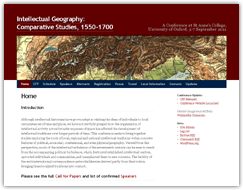
We are pleased to announce that booking is now open for Intellectual Geography: Comparative Studies, 1550-1700, the second Project conference, which will take place at St Anne’s College, Oxford, on 5-7 September 2010. Organised by Howard Hotson, the event brings together case studies and digital projects exploring the roots of local, regional, and national intellectual traditions and networks within concrete features of political, economic, confessional, and physical geography. For provisional programme information, a steadily growing lists of speaker profiles and abstracts, and to book online, please visit the conference website. The deadline for registrations is Wednesay 31 August.
James Brown
July 04, 2011
Events, Lectures, Project Updates
Tags: Astronomy, Europe, History of Science, John Wallis, Mathematics, Networks, Oxford, Royal Society, Seventeenth Century
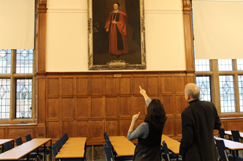
Kneller's 1699 portrait of Wallis in situ.
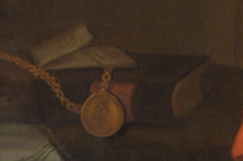
A telling epistolary detail.
In the eighth and final paper of our second seminar series on Thursday 23 June, our very own Dr Philip Beeley (University of Oxford) brought proceedings to a strong finish with a paper entitled ‘Oxford Science and the Republic of Letters: The Correspondence Networks of John Wallis’. Drawing on his intensive research on Wallis’s letters – two hard-copy editions of which he is preparing for publication with the support of the Project – Beeley argued that, in the absence of direct patronage, Wallis’s 246 individual correspondences enabled the mathematician, cryptographer, and (from 1649) Savilian Professor of Geometry to establish a name for himself within the broader European Republic of Letters. Indeed, the importance of epistolarity to Wallis is iconographically symbolised by the prominence of an opened letter in Kneller’s 1699 portrait of him (pictured), which now hangs in the University’s Examination Schools. Focussing on case studies, Philip used Wallis’s harmonious communications with the Danzig astronomer Johannes Hevelius to show how epistolary exchanges between distant friends could facilitate the kind of productive intellectual commerce and collaboration idealized by Comenius, Hartlib, and (in the context of the early Royal Society) Henry Oldenburg. However, switching his focus to Wallis’s more turbulent astronomical entanglements with the Dutch mathematicians Christiaan Huygens and Frans van Schooten, Beeley reminded us that the Republic of Letters was far from a gentleman’s club, and that interpersonal rivalries, methodological disuputes, accusations of plagiarism, and the quest for success and status remained powerful influences on scientific discussion throughout the second half of the seventeenth century. Questions focused on letters, mathematical pedagogy, and disciplinary formation; the importance of the patronage of Mary Vere during the first part of Wallis’s career; and unwritten codes of conduct and behaviour within the Republic of Letters. For past lectures in the series, please see the seminar webpage; details of the 2011 series will be available shortly.
 Podcast now available on the seminar page!
Podcast now available on the seminar page!










 Join
Join 